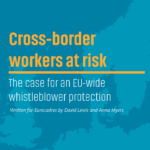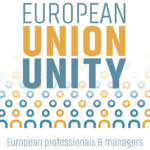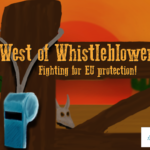Eurocadres is pleased to welcome Martin Todd as its new Communication & Campaign Officer.

The European Commission has released its directive proposal on whistleblower protection. Eurocadres’ efforts finally pay off.

Newsletter High hopes for whistleblower protection directive 20.4.2018Whistleblowing On Monday 23 April at 12.00 the Commission will introduce its directive proposal on whistleblower protection at a press conference with Vice-President…

With just over one week left until the foreseen publication of a legislative proposal from the European Commission on whistleblower protection, Eurocadres publishes a report making the case for a strong EU legislation.

Eurocadres offers training for trade unions on psychosocial health risks.

Newsletter Does high education lead to a high salary? 19.2.2018Gender equalityHigher education ETUC, the European Trade Union Confederation, is running Our Pay Rise, a campaign promoting a recovery of EU…

The future of the EU depends on the MFF, the long-term budget. This seven year plan will set the level of ambition on the various fields of activity of the European Union. Eurocadres underlines the need to continue increasing the investments in higher education, innovation and research.

Today the Court of Cassation in Luxembourg has cancelled the previous verdict of the famous whistleblower Antoine Deltour. This means that a new appeal trial will have to take place.

On 5 December an action demanding EU-wide whistleblower protection took place outside of Berlaymont, the main European Commission building.

In the Tripartite Social Summit on 16 November 2017 Eurocadres stressed just transition and criticised the lack of whistleblower protection.

On 14 November (2017) WhistleblowerProtection.EU, a platform which Eurocadres initiated in October 2016, met with Tiina Astola – Director General of DG JUST. The signatures of the petition and a list of the organisations participating in the platform were handed over.

Newsletter Video: General report shows Eurocadres’ work 5.11.2017General The General report shows what Eurocadres have been doing for four years before the Congress. Instead of only submitting a written report,…

Newsletter New policy programme & action plan 3.11.2017GeneralPolicy paper What do professionals and managers in Europe want and need? The Eurocadres 2017 Congress decided on the main policies and action…
We firmly believe that a more social Europe is a stronger Europe. Social divides within and between member states do not foster improved resilience.

Protecting whistleblowers helps to encourage a culture of transparency and accountability for public and private institutions. As professionals and managers are those who are most likely to come in contact with information which needs to be disclosed, they are fighting in the first line.

Eurocadres assembles for Congress in the premises of the Economic and Social Committee in Brussels on 30-31 October 2017.

The own-initiative report on the legitimate measures to protect whistleblowers acting in the public interest by Virginie Rozière was voted through in the European Parliament today by 399 votes for and 101 against. This is a strong political message that Europe needs whistleblower protection.

The report picks out those countries that have some sort of whistleblower protection in place – and the findings are remarkable. The report highlights that corruption costs approximately 120 billion euros per year in the EU! Of that sum, 5.3 billion is related to corruption in public procurement.

EU Commission published a report on working conditions of academic staff. Rapid and continuous changes in the world of academia affects employees.

The service package proposed by the European Commission on 10 January 2017 is causing debate in trade unions across Europe.

